by Jenny Savely | Jun 5, 2015
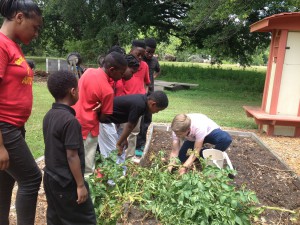
Youth learn how to grow and prepare vegetables during a gardening day camp in Escambia County.
Each summer, 4-H programs across the Florida panhandle offer a wide array of residential and day camps for youth ages 5-18. Summer residential and day camps are a great way for youth to be introduced to all that 4-H has to offer. Many camps explore specific 4-H projects, or topics, such as culinary arts, sewing, livestock or robotics, while others offer a smorgasbord of 4-H activities.
These camps differ from typical summer programs in that they are framed around the essential elements of positive youth development. 4-H is focused on developing life skills through educational programs that promote competence, confidence, connection, character, and compassion. The connection of 4-H to land grant universities like the University of Florida also means that camp curriculum is based on the best knowledge available about any given project, and taught by caring adults using learn-by-doing methods.
This summer youth are in no shortage of camps to satisfy their desire to learn while having fun. Below you can find a list of day camps that will be offered throughout the panhandle. Hurry and register your youth for the time of their life, spaces often fill quickly. Most counties also offer week long overnight camps at Camp Timpoochee or Camp Cherry Lake.
Contact the 4-H agent near you for more information and to register for any of these camps. Click on the county links below for more information. Register now and let the fun begin!
Calhoun County
July 6, 13, 20, 27 – Kids in the Kitchen, $10; Piping & Fondant Cake Decorating for Kids, $35 (or $35 for both camps)
Escambia County
June 2 – Garden to Plate Day Camp – $5, 8am-2pm (age 9-16) – Get in the kitchen with Chef David Bearl as he leads us in an interactive learning experience about cooking and activities that promote healthy lifestyles and Florida agriculture as they discuss gardening techniques and food safety.
June 17-19 – Dairy Day Camp – $5, 8am-2pm each day – Join us for three days of exploring the world of dairy. From care and biology to how to use the products of dairy cows, this camp will introduce you to the dairy industry while you make new friends and enjoy dairy related activities.
June 29 – Water Conservation Day Camp- $5, 8am-2pm – join Master Gardeners and Extension faculty in an exploration of the importance of water to our planet, how nature works to conserve it, and how we can do our part (prepare to get wet!).
July 15 – Community Awareness and Service Day Camp – $5, 8am-2pm –We will take trash items like plastic bags and jugs that you collect and reuse them to make useful items for people in need. This camp will focus on overuse and its environmental and social consequences.
July 21 – Search and Rescue Day Camp – $5, 8am – 2pm – Klaas Kids will join us for a day camp of fun and safety training. Youth will learn the process of search and rescue including how K9 units track and find lost children, and strategies youth can use for preventing crimes against them as well as what to do if they are lost in various settings.
Gadsden County
June 8 – 12 Clothing Adventures – $70, 8-5 – Youth will discover the science & technology behind fabrics, fabric care, fabric construction, and create projects.
June 15-19 Quirky Culinary Capers – $70, 8-5 – Youth will explore the magic of food science, prepare nutritious snacks, and learn how to improve their health for optimum living.
July 20-24 – It’s Alive: Junk Drawer Robotics – $70, 8-5 – Youth will engage in robotic design, use, construction, and control as they work in teams to make it come alive with everyday items. Wednesday, July 22 is challenged day in Tallahassee.
Jackson County
July 7 – Painting with a 4-H Twist Day Camp – $35, 5:00-9:00 – a local artist will walk youth step by step to the completion of a masterpiece to take home
July 20-22 – Junk Drawer Robotics – $80, 9:00 – 5:00 – learn how to make robots out of everyday household products. On the last day of camp there will be a Robotics contest with surrounding counties and will be held at the North Florida Fairground.
July 28-29 – SEW Much Fun- $45, 8:00-12:30 – designed for novice sewers with no previous experience. All materials are provided by the 4-H Department
August 6 – Cloverbud Explorations: The World of Rabbits and Poultry – $20, 8:30-11 (age 5-7) – learn how to select, properly care for, identify and enjoy a poultry or rabbit project
Jefferson County
June 22-26– Outdoor Recreation Day Camp – $35, 8:30-4:30 (age 10-15) – camp includes activities in: Forestry, Conservation, Wildlife, Archery, Air Rifles, and Sporting Clays
June 29 – July 2- Go Green in 2015 – $35, Mon. – Wed. 8-12, Thurs. 8-3 (age 5-7) – Story Time, Crafts, Fishing, Organized Recreation, Cooking, Swimming
July 8 – 12 – Go Green in 2015 – $35, Mon.-Thurs 8-4, Friday 8-12 (age 8-9) – Garden Project, Organized Recreation, Cooking, Swimming, Fishing
Leon County
June 22-26 – 4-H Wildlife camp – $80, 8-5 (age 10-18) – This outdoor nature camp will provide its participants with a basic understanding of environmental stewardship, wildlife, safety, and fun in an outdoor setting. Fun educational sessions covering National STEM (science, technology, engineering and math) initiatives will be taught by qualified instructors in aquatics, forestry, conservation, shooting sports, and orienteering.
June 30-July 2 – 4-H Outdoor cooking Camp – $80, 9-4 (age 9-13) – Youth will learn the safety and art of cooking over fire, and will go on a farm field trip.
July 13-17 – 4-H Previous Attendees Sewing Camp – $35, 8:30-12 (age 8-18) – This sewing camp is for previous 4-H sewing camp attendees or those with sewing experience. Refer to flier for required materials needed for camp.
Liberty County
June 8-11- 21st Century at W.R. Tolar School
June 15-17 – Exploring 4-H – $20, 9-4 (age 8-12) Sewing, Archery, Animals, Cooking, Bugs
June 29, July 1-3 – 21st Century at Hosford School
July 7- Rabbit Day Camp – $5, 9-4 (age 5-18)
July 20-22- Robotics Day Camp – $20, 9-4 (age 8-13)
Santa Rosa County
June 15-19 – 4-H Cooking Camp (age 8-12)- $100, 7:30-2 – Youth will learn to cook a variety of dishes and bring home a few yummy dishes! Baking, measuring, safety tips, food planning, grocery shopping, reading labels, frying, nutritional education, grilling, canning, bread-making and more will be on the agenda.
June 22-26 – Discovering 4-H Day Camp – $100, 7:30-4 – These days will expose youth all the projects Santa Rosa County 4-H has to offer. Monday: Trip to Bear Lake for wildlife and natural resources hike. Tuesday: Farm tour. Wednesday: Navarre Marine Ecology and Butterfly house. Thursday: Archery and garden tour. Friday: Nutrition, peanuts, beekeeping.
Wakulla County
June 15-17 – 4-H Sewing and Crafts Camp – $35, 8:30-4:30 – “learning sewing and artistic crafts, one stich at a time.” The camp will focus on basic sewing and crafting skills.
June 24-26 – 4-H Cooking Day Camp – $35, 8:30-4:30 – “a chef in the garden, a scientist in the kitchen.” The campers will learn how to cook simple, healthy, meals, while exploring where food comes from, and how, scientifically, it can be transformed into delicious meals through cooking.
Walton County
June 11 – Silly Science Cloverbuds (age 5-7) – $15, 8:30-12:30 – will feature fun science experiments
June 15-18 – 4-H Growing Roots – $30, 8:30-4:00 – feature a little bit of everything, like health & fitness, finances, Agriculture, beekeeping
July 13-16 – Seaside Robotics – $40, 8:30-4:00 – features not only assembly but programming
July 20-23 – X-Treme Cuisine – $30, 8:30-4:00 – will teach healthy snack and meal preparation, cooking, and basic kitchen safety
by Stefanie Prevatt | May 29, 2015
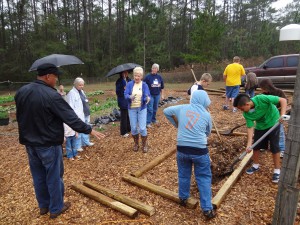
Photo credit: Zulema Wibmer, 4-H Program Assistant, Leon County 4-H Office
Garden-based education is taking America by storm. While this is concept dates as far back as the seventeenth century, it certainly feels like the popular movement of the day. 4-H has been using garden based education since 1902 with tomato and corn clubs to teach life skills such as resiliency, planning and organizing, and communication. These same skills are necessary to become a successful entrepreneur:
Resiliency: the ability to try again after failure. A garden is the perfect place for youth to test ideas or try new things. As adults, we know that sometimes the key to success is (safe) failure! If you are using a garden your classroom, allow creative experimentation. Success will build on itself and trials that missed the mark will make for more lively discussion and group cohesion.
Planning/organizing: the process of figuring out what to do (planning) and how to do it (organizing). Whether you are starting new or continuing an existing project, allowing the expression of youth ideas and goals – followed by their help implementing these plans – is crucial to your project’s success. Remember, we can grow all the vegetables in the world, but if the youth don’t learn or feel a sense of accomplishment related to the project, all we did was grow vegetables.
Communication: the exchange of thoughts, messages, or information, as by speech, signals, writing, or behavior. In today’s tech savy world, we are losing the ability to communicate in person and in writing. You have a unique opportunity to work with your group together, or as individuals, to discuss (or write descriptively) about your garden.
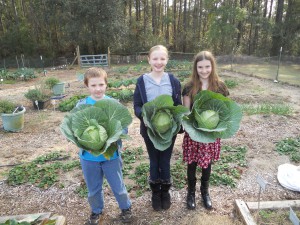
Photo credit: Zulema Wibmer, 4-H Program Assistant, Leon County 4-H Office
UF IFAS Extension offers many resources to help both youth and adults become entrepreneurs in the food industry. Food entrepreneurship has really exploded with the Cottage Food Law. Many County Extension Offices offer workshops and seminars on food entrepreneurship, and there are also some great online resources to help you get started:
If you have a green thumb, consider going “totally green” as a 4-H gardening volunteer or Master Gardener. 4-H needs caring adults like you to share their knowledge and passion for gardening with the next generation. Through the 4-H gardening project, youth not only learn gardening knowledge and skills, they also learn responsibility, teamwork, and other life skills that will help them grow up to be compassionate and competent citizens. To get involved, contact your local UF IFAS Extension Office, or visit http://florida4h.org./volunteers.
Your opinion matters! Please provide feedback on this short survey to help us improve our blog: https://ufl.qualtrics.com/SE/?SID=SV_3gtLKjqia3F75QN
by Melanie Taylor | May 22, 2015
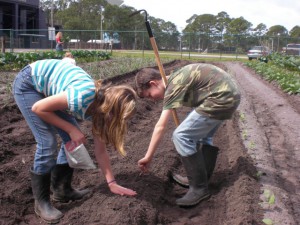
Planting Time
Did you know that something as simple as a garden can help youth not only learn to love vegetables, but also improve their science scores? Fifth-graders at Port St. Joe and Wewahitchka Elementary Schools experienced the benefits of gardening this year through the 4-H Seed to Plate Program. This program teaches youth how to plant, maintain, and harvest a vegetable garden, and is part of the science curriculum taught by 5th grade teachers.
Before the 130 students ever stepped foot in the garden they spent class time discussing the act of planting, the role that bees play in pollination and took a field trip to the North Florida Research and Education Center for 4-H Ag Adventures Day. This program is under the direction of Gulf County Extension Director Roy Lee Carter. The garden program is also supplemented with nutritional and food safety programs taught by Gulf County 4-H/Family & Consumer Science Agent, Melanie Taylor and Family Nutrition Program Assistant, Kay Freeman.
Carter said that the fifth grade is the ideal age level to learn gardening because the students are able to retain what they learn, and apply their new skills at home. The program is part of the science classes taught by the fifth-grade teachers each year. David and Sally Beyl have been volunteers with the program for the last seven years. Both are Master Gardeners who trained at the University of Florida for 12 weeks and contribute more than 50 hours of horticulture-related volunteer work each year.
“The students love it,” said David Beyl. “You can tell that they enjoy the experience.”
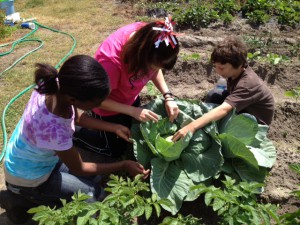
Harvest Time
A portion of what grows in the gardens was donated by Bonnie Plants in Alabama, the Florida Farm to School program, and the University of Florida’s Institute of Food and Agricultural Sciences. The Farm to School Partnership (administered by IFAS) works with local farmers to improve the supply of fresh produce to schools. Cabbage, lettuce, strawberries, potatoes, carrots, onions, eggplant, watermelon, beans, peppers, squash, sugarcane and various herbs made up this year’s garden with produce grown in-ground and in pots. “We use pots to show the students that even if you don’t have room for a garden, you can still have a garden,” Beyl said. In small groups, students learned how to plant seeds, rake, fertilize, cultivate, and harvest. Students even took home cabbages, carrots and potatoes to prepare and share with their families. Those who had an interest in starting their own gardens were given seeds to plant at home.
The highlight of the program is a luncheon prepared by cafeteria staff with produce grown by students. Everything the students munched on came from the garden they spent eight months cultivating. Both school principals are supportive and find this hands-on opportunity a great addition to the science program. This 4-H and public school collaboration is a very successful, educational and fun-filled learning experience.
If you have a green thumb, consider going “totally green” as a 4-H gardening volunteer or Master Gardener. 4-H needs caring adults like you to share their knowledge and passion for gardening with the next generation. Through the 4-H gardening project, youth not only learn gardening knowledge and skills, they also learn responsibility, teamwork, and other life skills that will help them grow up to be compassionate and competent citizens. To get involved, contact your local UF IFAS Extension Office, or visit http://florida4h.org./volunteers.
Your opinion matters! Please provide feedback on this short survey to help us improve our blog: https://ufl.qualtrics.com/SE/?SID=SV_3gtLKjqia3F75QN.
by Jena Gilmore | May 15, 2015
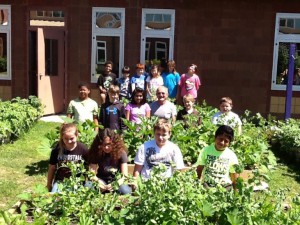
4-H School Gardens help youth learn about science, food and nutrition, and life skills such as responsibility.
Mary, Mary quite contrary, how does your garden grow?
With 4-H volunteers, Essential Elements of Positive Youth Development, and UF IFAS Extension all in a row!
School gardens have become the perfect avenue to implement experiential learning. They provide the students with a safe environment which fosters cooperative learning, and focuses on nurturing the essential elements youth require in order to become competent caring citizens. Joe Crozier is a Master Gardener and 4-H volunteer in Walton County. Joe has extensive knowledge in gardening including container gardening and hydroponics. Joe has shared his success and expertise in hydroponics through Master Gardener workshops in the Florida panhandle. However, Joe has a passion for sharing his knowledge with children through the 4-H gardening project and was recruited by the Assistant Principal at Freeport Elementary to begin gardening with the 4th Grade classes.
When asked what inspires Joe to continue to be a 4-H Volunteer, he says “The questions the students ask, and most of all, the smiles on their faces as they plant seeds and become part of the 4-H School Garden Program.”
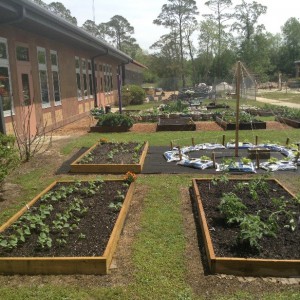
The 4-H School Garden at Freeport Elementary would not have been possible without Joe’s volunteer service
Last year, Joe developed a raised bed garden at Freeport Elementary, which has now expanded to include a bean tee-pee and additional beds. Each student had their own section, per their request, in order to master their green thumb. Prior to this, and the ignition to their new found passion for gardening, the students participated in the “Potato Project,” and grew potatoes in laundry baskets. The students were amazed that this was possible, not to mention the quantity and quality of potatoes that emerged! Once the potatoes were harvested, the children prepared them for cooking and the lunchroom returned the favor by providing each classroom with their own piping hot buttery new potatoes. Children who wouldn’t normally touch vegetables eagerly awaited the moment they could taste the fruit of their labor.
Joe has devoted countless hours to the 4-H School Gardens Program. When asked how 4-H has made a difference in the lives of the students at the school, Joe stated “They involve their parents when they take what they’ve learned in the garden home! Some children have never been taught how to garden or how to grow their own food. Spending time teaching these children makes me so happy and is so contagious that my family notices how proud I am of them.” Thanks to his diligence and dedication, more schools are eager to join the Potato Project and develop their own 4-H School Gardens in Walton County.
If you have a green thumb, consider going “totally green” as a 4-H gardening volunteer! 4-H needs caring adults like you to share their knowledge and passion for gardening with the next generation. Through the 4-H gardening project, youth not only learn gardening knowledge and skills, they also learn responsibility, teamwork, and other life skills that will help them grow up to be compassionate and competent citizens. To get involved, contact your local UF IFAS Extension Office, or visit http://florida4h.org./volunteers.
Your opinion matters! Please provide feedback on this short survey to help us improve our blog: https://ufl.qualtrics.com/SE/?SID=SV_3gtLKjqia3F75QN.
by jgl1 | May 1, 2015

Outgrown clogs can make an excellent container garden.
Research shows that gardening in school and clubs positively influences youth environmental attitudes, nutritional attitudes, self-esteem, test scores, school attitudes, interpersonal skills, social concerns and behavior. For example, students in third and fifth-grade who learn science through gardening scored higher than students who did not learn science through the use of a garden (National Gardening Association, 2002). The first step is helping your club or class select a garden style. The three most common types of gardens are raised-beds, container, and your typical in-ground garden. This article will provide some tips in helping you decide what type garden is perfect for your 4-H Club or 4-H Classroom.
Container Gardens– Container gardens are extremely kid-friendly and are an excellent choice if you have little space, poor soil, or are surrounded by cement and blacktop. Even the smallest outdoor nook can feature a thriving crop of vegetables, herbs, and flowers in containers.
Benefits of Container Gardening Include:
- Maximizing your space. You can take advantage of small areas like sunny window ledges and courtyards.
- Testing the waters. You may want to make sure gardening will work well with your club before committing lots of resources.
- Portability. If you are faced with challenges — vandalism and theft, or upcoming construction that will displace your plots — you can design container gardens that can be easily moved on a daily or seasonal basis.
- Soil control. By using containers, you can be confident about the safety of your growing media and enjoy eating your harvest. This is a concern where soil may be contaminated with lead or other industrial pollutants.
- Blacktop greening. Perhaps you are in an area void of soil and green space. You can place containers on concrete or cement surfaces.
- Deer, rabbits, and other wildlife are less likely to dine on plants in your container garden.
- Keep in mind though, that bigger is often better. The bigger your container, the more soil it will hold. In container gardening, more soil means better water retention, which means you have more latitude with watering and that usually increases your chances of success.
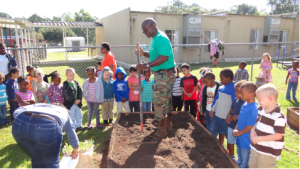
Jefferson County 4-H Agent, John Lilly, shows teachers how to prepare a raised bed garden.
Raised-bed Gardens– A raised bed garden is built from wood or plastic boards, typically four feet wide and as long as desired (four-feet-by-four feet for square foot gardening, up to 14 feet long rectangular beds). Because much of Florida soil is sandy and does not hold many nutrients, the deeper the garden beds, the better the soil will be. Many schools stack two boards on top of one another to achieve a 10 to 12-inch high garden bed, using 18-inch wooden stakes to keep the boards together. Potting mix, compost or garden sand from the site itself are added to fill the boxes, leaving two inches from the top as clearance. Raised beds help prevent kids from walking on delicate plant roots, clearly marks the boundaries of the bed and reduces some soil-borne pest problems. Clubs in urban areas have constructed raised beds directly on asphalt or concrete surfaces with successful results.
Benefits of Raised-Bed Gardening include:
- More control over the location of the garden
- Ability to choose the best soil for your particular plants
- More efficient draining
- Can be easier on backs and knees due to less bending and stooping
- Easier to keep out weeds
- The soil warms up earlier in a raised bed, so you can plant earlier and extend your growing season

The 4-H gardening project teaches valuable science and life skills.
In-Ground Gardens– Vegetables, fruit trees, and flowerbeds (such as butterfly gardens) can all grow directly in the ground, as farmers have for centuries. Gardens can be as small as four-feet-by-four-feet, or as large as the garden committee is willing to implement. Before planning a garden, dig several holes at the proposed site to collect soil samples for a pH test and to determine the soil type. Your local County Extension Office can test the soil. Most plants grow best with a pH of seven, but some have different pH requirements. Low-lying or seasonally moist areas will require different plants than high, dry, sunny areas with sandy soil.
Benefits of In-Ground Gardening Include:
- Use of existing soil. Most soils are perfectly fine for gardening, provided the soil is properly tilled, mulched and watered. Even without organic amendments, most soils can produce a bountiful harvest.
- Less start-up work (and cost). A flat, well-drained area can be quickly and easily prepared with a large rotor-tiller. You can also save on soil and bed or container materials.
- An in-ground garden can easily be replaced by another crop or moved to another location.
- Lower water requirements. In-ground beds won’t dry out as quickly as raised beds and will, therefore, require less water to maintain.
- Irrigation systems for flat, in-ground gardens are simple to design and easy to install compared to raise beds that require careful design and installation.
If you have a green thumb, consider going “totally green” as a 4-H gardening volunteer! 4-H needs caring adults like you to share their knowledge and passion for gardening with the next generation. Through the 4-H gardening project, youth not only learn gardening knowledge and skills, they also learn responsibility, teamwork, and other life skills that will help them grow up to be compassionate and competent citizens. To get involved, contact your local UF IFAS Extension Office, or visit http://florida4h.org./volunteers.
Your opinion matters! Please provide feedback on this short survey to help us improve our blog: https://ufl.qualtrics.com/SE/?SID=SV_3gtLKjqia3F75QN.
by Heather Kent | Apr 13, 2015

Mrs. Ruth Ann Scurry has been a volunteer for the Jefferson County Hickory Hill 4-H Club for 20 years.
What keeps a volunteer motivated to serve for more than 20 years? If you ask Mrs. Ruth Ann Scurry, a Jefferson County 4-H club leader, she will tell you it’s about making a difference in a young person’s life! Mrs. Scurry raised three sons who were active 4-H members. Her son Kenya even competed at the state level with his demonstration on small engines. Her sons benefited so much from the 4-H program that when her youngest son graduated, she decided to start a 4-H club at her local church called the Hickory Hill 4-H Club. Twenty years later, she still leads this club which focuses on healthy living programs, as well as sewing, gardening, fishing, and consumer choices.
When asked what advice Mrs. Scurry has for club leaders, she shared, “you have to remember to keep the lessons you teach practical and hands on. When teaching nutrition, I show them what a portion size is and remind them to each like a king (breakfast), queen (lunch), and pauper (dinner). If you use examples and language they understand, they will remember. You also have to keep it fun. I make sure to plan a fun treat every now and then to keep the kids motivated and surprised and it works every time. They never want to miss a meeting!”
When asked what is most challenging about being a volunteer today, Mrs. Scurry says, “Many young people today live with only one parent, grandparent, or other relative. These families need help raising their children. 4-H encourages them to make good choices and helps them feel like they belong to an extended family- a 4-H family. 4-H helps them learn how to follow rules and to respect others. Being a good role model is important too. It’s so true that ‘it takes a village to raise a child.’”
Mrs. Scurry has helped build a “4-H village” of caring adult volunteers for her club. She offers simple yet sage advice on how to do this: “Get everyone involved.” She involves everyone from 5-years olds to 83 years old as members and volunteers in her club. She empowers them to make a difference in the lives of 4-H youth by finding out what their strength is, and then asking them to share that strength with the club through an activity, field trip, demonstration, or project.
Mrs. Scurry has not limited her service to just her club. She has also volunteered as a chaperone for 4-H Camp Cherry Lake, the North Florida Fair, and even spearheaded a volunteer appreciation luncheon for local volunteers and community leaders.
Mr. John Lilly, the Jefferson County Extension Director stated, “All of Ms. Scurry’s hard work and dedication affects the entire Jefferson County 4-H Program in a positive way. We are fortunate to have such a loyal and faithful volunteer leader.”
In honor of National Volunteer Appreciation Week, 4-H in the Panhandle is sharing stories of inspirational 4-H volunteers every day this week. if you find Mrs. Scurry’s story inspiring, consider becoming a volunteer yourself! Nearly 3,000 volunteers in the Florida panhandle are making a difference in the lives of more than 28,000 youth. In 4-H, you can leverage your experience and skills to help a young person find their own passions and interests. 4-H needs volunteers like you to inspire the next generation. To learn how to become a 4-H volunteer, contact your local Extension Office or visit http://florida4h.org/volunteers.
Your opinion matters to us! Please take this short survey to help make our blog better. https://ufl.qualtrics.com/SE/?SID=SV_3gtLKjqia3F75QN











